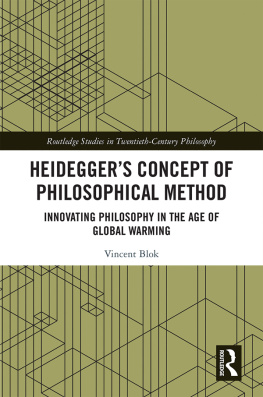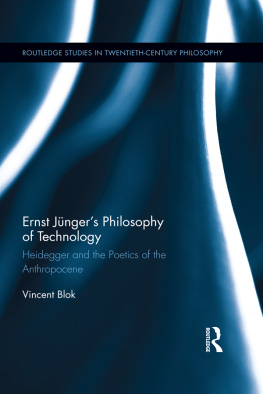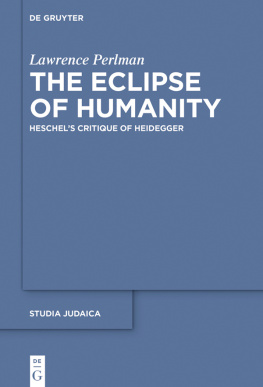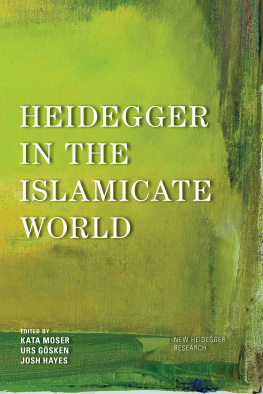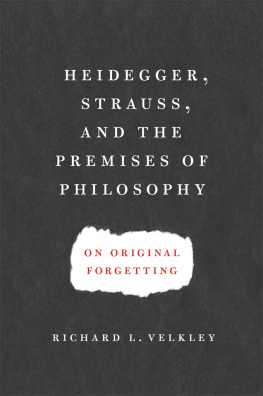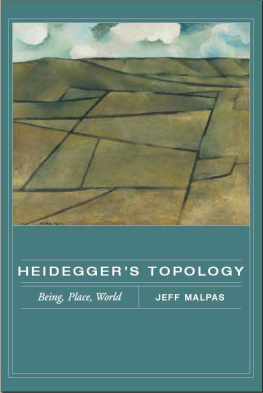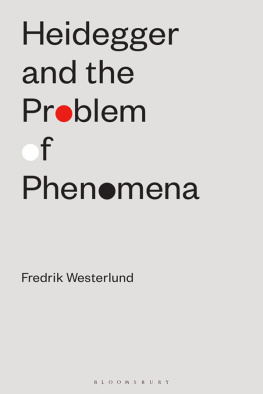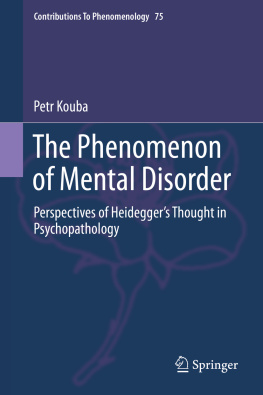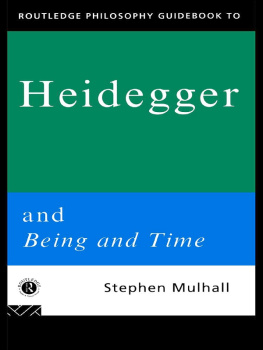Contents
Landmarks
Heideggers Concept of Philosophical Method
This book provides new interpretations of Heideggers philosophical method in light of 20th-century postmodernism and 21st-century speculative realism. In doing so, it raises important questions about philosophical method in the age of global warming and climate change.
Vincent Blok addresses topics that have yet to be extensively discussed in Heidegger scholarship, including Heideggers method of questioning, the religious character of Heideggers philosophical method, and Heideggers conceptualization of philosophical method as explorative confrontation. He is also critical of Heideggers conceptuality and develops a post-Heideggerian concept of philosophical method, which provides a new perspective on the role of willing, poetry, and earth-interest in contemporary philosophy. This earth-interest turns out to be particularly important to consider and leads to critical reflections on Heideggers concept of Earth, the necessity of Earth-interest in contemporary philosophy, and a post-Heideggerian concept of the Earth.
Heideggers Concept of Philosophical Method will be of interest primarily to Heidegger scholars and graduate students, but its discussion of philosophical method and environmental philosophy will also appeal to scholars in other disciplines and areas of philosophy.
Vincent Blok is associate professor in Philosophy of Technology, Business Ethics and Responsible Innovation, Wageningen University (The Netherlands). He holds a PhD in philosophy of technology from Leiden University. His books include Ernst Jngers Philosophy of Technology. Heidegger and the Poetics of the Anthropocene (Routledge 2017). See www.vincentblok.nl for more information about his current research.
Routledge Studies in Twentieth-Century Philosophy
41 Ernst Jngers Philosophy of Technology
Heidegger and the Poetics of the Anthropocene
Vincent Blok
42 Bertrand Russell and the Nature of Propositions
A History and Defence of the Multiple Relation Theory of Judgement
Samuel Lebens
43 Benjamin, Adorno, and the Experience of Literature
Edited by Corey McCall and Nathan Ross
44 Heidegger on Technology
Edited by Aaron James Wendland, Christopher Mervin, and Christos Hadjioannou
45 Revolution and History in Walter Benjamin
A Conceptual Analysis
Alison Ross
46 Literary and Cultural Alternatives to Modernism
Unsettling Presences
Edited by Kostas Boyiopoulos, Anthony Patterson, and Mark Sandy
47 Heideggers Concept of Philosophical Method
Innovating Philosophy in the Age of Global Warming
Vincent Blok
For more information about this series, please visit: https://www.routledge.com/Routledge-Studies-in-Twentieth-Century-Philosophy/book-series/SE0438
First published 2020
by Routledge
52 Vanderbilt Avenue, New York, NY 10017
and by Routledge
2 Park Square, Milton Park, Abingdon, Oxon OX14 4RN
Routledge is an imprint of the Taylor & Francis Group, an informa business
2020 Taylor & Francis
The right of Vincent Blok to be identified as author of this work has been asserted by him in accordance with sections 77 and 78 of the Copyright, Designs and Patents Act 1988.
All rights reserved. No part of this book may be reprinted or reproduced or utilised in any form or by any electronic, mechanical, or other means, now known or hereafter invented, including photocopying and recording, or in any information storage or retrieval system, without permission in writing from the publishers.
Trademark notice: Product or corporate names may be trademarks or registered trademarks, and are used only for identification and explanation without intent to infringe.
Library of Congress Cataloging-in-Publication Data
A catalog record for this title has been requested
ISBN: 978-0-367-41812-0 (hbk)
ISBN: 978-0-367-81642-1 (ebk)
Typeset in Sabon
by codeMantra
Dedicated to my students (Jochem Zwier, Lucien von Schomberg, Roel Veraart)
Voorburg, The Netherlands, May 15 2019
Earlier versions of portions of appeared as Nothing Else Matters: Towards an Ontological Concept of the Materiality of the Earth in the Age of Global Warming, Research in Phenomenology 19(1) (2019).
I am very grateful for the fruitful comments of Peter Reynaert on an earlier draft of . Thanks also to Mithun Bantwal Rao, Lucien von Schomberg, Roel Veraart, and Jochem Zwier who proofread parts of the manuscript and provided fruitful comments.
This book could not have been written without the long-lasting inspiration of my doctoral supervisor, Wouter Oudemans. Another source of inspiration for this study was a reading group at Nijmegen University, from 2007 to 2013, on the philosophy of Martin Heidegger. The fruitful discussions with Chris Bremmers, Ben Vedder, Gert-Jan van der Heiden, and many others were very helpful to test my interpretation of Heidegger in this book. I am also very grateful for the reading group on philosophy and art that I started during my studies in philosophy. The fruitful discussions with Martijn Pieterse, David Gosker, and many others over the years helped me to navigate in the difficult domain of art. Another source of inspiration was the reading group at Wageningen University that I started in 2014 on the intersection of fundamental philosophy and the natural sciences, together with my dear philosophical friend Pieter Lemmens. The fruitful discussions with him, Jochem Zwier, Bart Gremmen, Henk van den Belt, Guido Ruivenkamp, and many others were very helpful for the development of my ideas in this book.
I would like to thank Catherine ODea for her great help in editing my work in proper English and Wageningen University for its support while I was writing this book. Finally, I would like to thank my wife and children, Petra, Gudrun, Storm, and Demian, for their support, love, and understanding while I was working on weekends to finalize this book.
In his 1936 book, The Crisis of the European Sciences and Transcendental Phenomenology, Edmund Husserl calls attention to a crisis in modern philosophy. This crisis concerns the questionability of the scientific method of philosophy. On the one hand, modern philosophy appreciates the naturalism and objectivism of the positive sciences and tends to mimic their approach. On the other hand, however, because of scepticism about its ability to live up to its ideal of being a universal science with an apodictic method of research, philosophy threatens to perish. According to Husserl, the unscientific character of modern philosophy consists in the unlawfulness and uncertainty about its method.
In response to this crisis, Husserl developed the transcendental phenomenological method of philosophy. The ambition of this new method is not, however, to live up to the ideals of the positive sciences. For the positive sciences too are in crisis, according to Husserl. The crisis of the positive sciences consists in their unilateral orientation towards objectifiable positive facts, while neglecting the decisive questions for human existence regarding the sense or meaning of life. This sense or meaning is not just a subjective illusion that has to be rejected in favour of positive facts but rather constitutes a domain of scientific study in its own right. The crisis of the sciences, therefore, consists in the questionability of a scientific method that avoids this type of question and ignores the sense or meaning of human life in favour of the positive facts; the crisis of the philosophical approach that mimics the method of the positive sciences consists in its uncritical conformity to this scientific ideal and its inability to rehabilitate the centrality of questions regarding the ideals, values, and norms of human life. The positive sciences have decapitated philosophys original orientation on the meaningful order of life, and phenomenology once again focuses precisely on the sense or meaning of human life (see Crowell, 2001).

